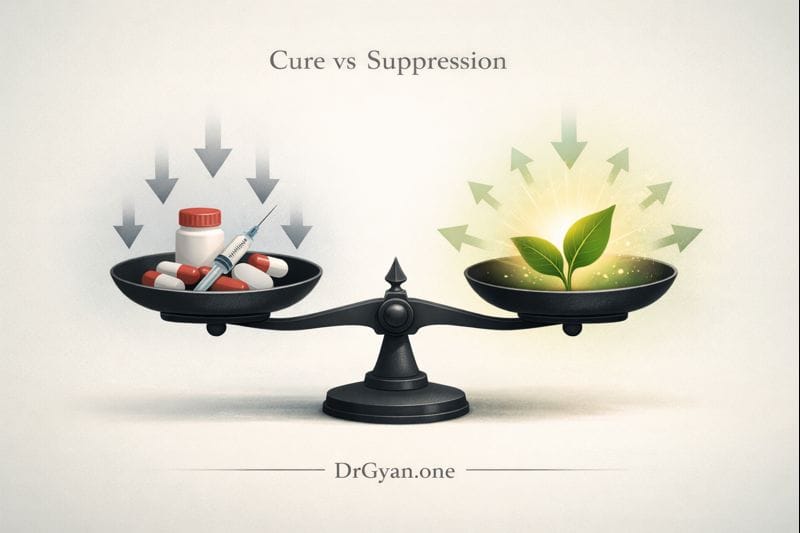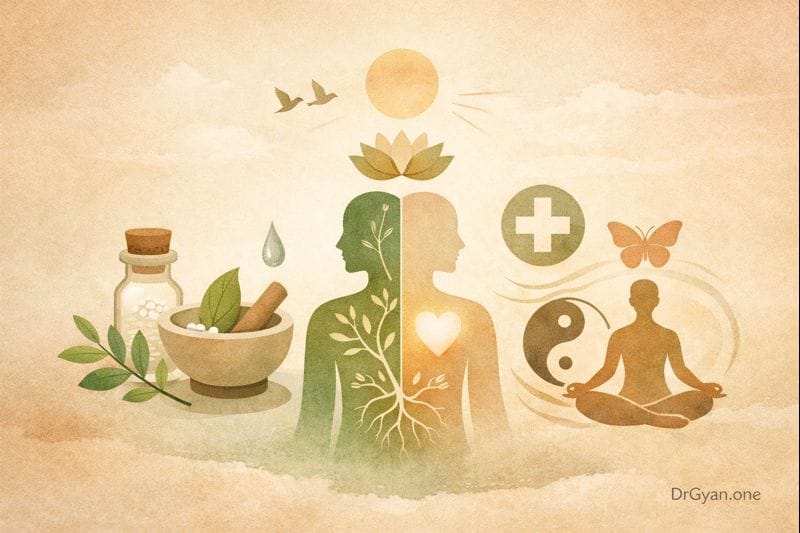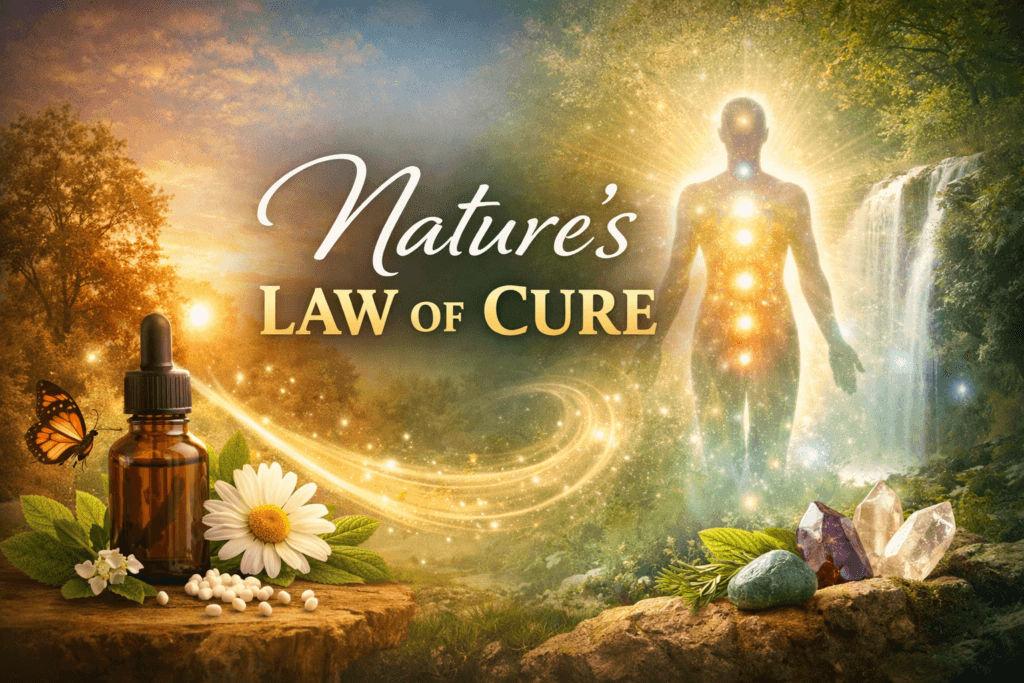Can allopathy and homeopathy go together? Learn the real difference between curative and palliative treatment, why mixing medicines may suppress disease, and what true homeopathy teaches about lasting healing.

Table of Contents
Can Allopathy and Homeopathy Go Together? A Deeper Look Through the Lens of True Cure
There is a widespread belief today that homeopathic medicines can be taken alongside allopathic treatment to achieve faster or better results. Many patients are reassured with statements like “They don’t interfere with each other” or “You can safely combine both.”
From years of observation, clinical experience, and a deep understanding of homeopathic philosophy, I must state this clearly and responsibly: I do not agree with this belief.
In reality, combining allopathy and homeopathy often creates confusion within the body, delays true healing, and may cause deeper harm instead of cure.
To understand why, we must first understand the fundamental difference between these two systems of medicine.
So, it is a clear no to this question: Can Allopathy and Homeopathy Go Together?
Curative Treatment vs. Palliative Management
The Core Difference That Changes Everything
All medical approaches broadly fall into two categories:
1. Curative Treatment
Curative treatment aims to remove disease from its very roots.
It does not merely reduce or hide symptoms; instead, it addresses the underlying disturbance within the organism and restores balance at a deeper level.
A true cure leads to:
- Permanent relief
- Strengthening of vitality
- Reduced susceptibility to future illness
2. Palliative Management
Palliative management focuses on suppressing symptoms to provide temporary relief.
While the patient may feel better outwardly, the inner disease process remains unresolved.
In many cases, suppression forces the disease:
- From surface to deeper organs
- From functional disturbance to structural pathology
- From mild expressions to more serious chronic conditions
This is why symptom relief should never be confused with true healing.
So, it is a clear no to this question: Can Allopathy and Homeopathy Go Together?
Why Suppression Is Dangerous in the Long Run
When symptoms are repeatedly suppressed:
- The body loses its natural expression of disease
- Warning signals are silenced
- The disease is pushed inward, becoming more complex and stubborn
Initially, this suppression may feel like improvement. But over time, patients often develop new, more serious illnesses, unexplained complications, or chronic conditions that are far more difficult to treat.
This distinction is critical—because homeopathy and allopathy work in opposite directions.
So, it is a clear no to this question: Can Allopathy and Homeopathy Go Together?
Homeopathy: A System Rooted in True Cure
Homeopathy is fundamentally a curative system of medicine.
It works in harmony with what is known as Nature’s Law of Cure, described in detail by Dr. Samuel Hahnemann.
According to this law, genuine healing occurs:
- From within outward
- From more vital organs to less vital ones
- From newer symptoms to older, long-forgotten complaints
This process may sometimes appear confusing to patients unfamiliar with it, but it is actually a sign of true internal correction.
Homeopathy does not treat isolated symptoms.
It treats the individual as a whole, addressing:
- Physical complaints
- Emotional patterns
- Mental tendencies
- Past and present disease expressions
The goal is not temporary comfort, but deep, lasting restoration of health.
So, it is a clear no to this question: Can Allopathy and Homeopathy Go Together?
Allopathy: Primarily a Palliative Approach
Allopathy, in most cases, operates through symptom control and suppression.
Medications are designed to:
- Block biochemical pathways
- Reduce inflammation, pain, fever, or discomfort
- Control measurable parameters
While this approach can be essential in emergencies and acute crises, it does not aim to remove the disease tendency itself.
From a homeopathic perspective:
- The disease is not eliminated
- It is merely held down or masked
- The vital force remains disturbed beneath the surface
This creates a direct contradiction when used alongside homeopathy.
One system is trying to push disease inward.
The other is trying to bring it outward for elimination.
How can the body follow two opposite commands at the same time?
So, it is a clear no to this question: Can Allopathy and Homeopathy Go Together?
Can Allopathy and Homeopathy Ever Be Used Together?
This is a common and important question.
Historically, Dr. Samuel Hahnemann did acknowledge the concept of palliation—but with a very specific and often misunderstood distinction.
He did not advocate the use of crude, strong allopathic drugs alongside homeopathy.
Instead, he referred to:
- Dynamic, minimal doses
- Remedies that are opposite to disease symptoms, not identical to patient symptoms
- Temporary measures used only when absolutely unavoidable
These were meant to be gentle, short-term, and non-suppressive, unlike modern pharmaceutical palliation.
Unfortunately, in real-world practice today, what I commonly see is this:
A Clinical Reality I See Repeatedly
Many patients begin homeopathic treatment and start improving.
As deeper layers of disease begin to surface, old or unfamiliar symptoms may appear—a normal and expected part of curative healing.
Instead of understanding this process, patients often panic and assume:
“A new disease has started.”
They then rush to an allopathic physician and begin additional medication.
The result?
- The disease is again suppressed
- The natural curative process is interrupted
- The illness returns later in a more aggressive and complicated form
- Even the correct homeopathic remedy now takes longer to act
Each layer of suppression adds complexity and delays recovery.
My Clear Advice: Choose One Path and Commit Fully
If you genuinely wish to be free from disease, not just comfortable for the moment, commitment is essential.
Once you decide to undergo homeopathic treatment:
- Avoid all other medications unless absolutely unavoidable
- Do not self-medicate with over-the-counter drugs
- Avoid external suppressive applications
- Allow the body to express and release disease naturally
Yes, in certain long-standing cases, gradual reduction of allopathic medicines may be necessary. This should always be done carefully and responsibly, never abruptly.
But the direction must be clear.
Healing cannot move forward if the body is constantly receiving contradictory signals.
So, it is a clear no to this question: Can Allopathy and Homeopathy Go Together?
The Deeper Goal: Self-Reliance and Inner Strength
True homeopathy aims to make the individual:
- Less dependent on medicines
- More resilient to disease
- Stronger at physical, emotional, and subtle levels
As treatment progresses, the body begins to:
- Peel away layers of suppressed illness
- Resolve old, forgotten ailments
- Restore natural balance and vitality
This is not an overnight process.
It requires patience, trust, and faith in the healing journey.
Final Thoughts: Healing Is a Journey, Not a Shortcut
If your goal is merely symptom relief, mixing treatments may seem tempting.
But if your goal is:
- Long-term health
- Freedom from chronic disease
- Protection from future illness
Then true homeopathy demands clarity and commitment.
Healing unfolds step by step.
Trust the process.
Stay the course.
In time, the body transforms—not just symptomatically, but at its very core.
So, it is a clear no to this question: Can Allopathy and Homeopathy Go Together?
Disclaimer
This article is for educational and awareness purposes only. It does not replace individualized medical consultation. Decisions regarding starting, stopping, or modifying any treatment should always be made under the guidance of a qualified healthcare professional.
I

